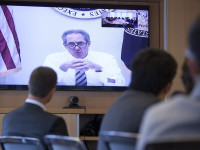The U.S. released its annual piracy watch list last week, elevating Canada to the priority watch list alongside countries such as China and Russia. If that sounds implausible, that’s because it is. The U.S. has long used its annual report on IP issues to exert pressure on other countries and this year is no different. Indeed, with the IP chapter still unresolved in the NAFTA negotiations, the decision to elevate Canada appears to be an obvious effort to place negotiators on the defensive. In doing so, the U.S. has further undermined the credibility of a review process that is widely recognized as little more than a lobbying exercise.
Post Tagged with: "special 301"
Canadian Government on U.S. Special 301: We Don’t Recognize Validity of Flawed Report
The U.S. Trade Representative is conducting a hearing today on the Special 301 report, its annual list of countries it claims have inadequate intellectual property protections. Several countries will appear alongside many lobby groups. I’ve previously posted on how the report from the IIPA, which represents the movie, music, software and publishing industries, badly misstates Canadian law. Indeed, with recent court decisions, Canada now has one of the toughest anti-piracy rules in the world.
I recently obtained documents under the Access to Information Act that confirm the Canadian government’s rejection of the Special 301 process. Canada will not bother appearing today largely because it rejects the entire process. According to a memorandum drafted for Canadian Heritage Minister Melanie Joly after last years’ report:
Stop Being Poor: U.S. Piracy Watch List Hits A New Low With 2012 Report
The inclusion of Canada on the priority watch list is so lacking in objective analysis as to completely undermine the credibility of the report. The Canadian “analysis” amounts to 173 words that hits on the usual dubious complaints (and given criticism of countries such as Chile for their notice-and-notice system, Israel for their statutory damages rules, and many countries on border enforcement, the Canadian criticism will clearly not end with the enactment of Bill C-11). By comparison, China is treated as equivalent to Canada on the priority watch list, yet garners over 4,600 words.
Earlier this year, I completed a submission with Public Knowledge to the USTR Special 301 process that examined current Canadian law as well as Bill C-11. It concluded:
Why Canada Does Not Belong on the U.S. Piracy Watchlist
While the Canadian government has consistently rejected the U.S. list because it “basically lacks reliable and objective analysis”, this year I teamed up with Public Knowledge to try to provide the U.S. Trade Representative Office with something a bit more reliable and objective. Public Knowledge will appear at a USTR hearing on Special 301 today. In addition, last week we participated in meetings at the U.S. Department of Commerce and USTR to defend current Canadian copyright law and the proposed reforms.
The full submission on Canadian copyright is available here. It focuses on four main issues: how Canadian law provides adequate and effective protection, how enforcement is stronger than often claimed, why Canada is not a piracy haven, and why Bill C-11 does not harm the interests of rights holders (critics of Bill C-11 digital lock rules will likely think this is self-evident). The section challenging the piracy haven claims states the following:
New Zealand Angry Over US IP Watch List
Add New Zealand to the growing list of countries upset over this year’s USTR Special 301 list. Opposition politicians and independent academics view the placement as gearing up for the Trans Pacific Partnership negotiations and an attempt to increase drug prices in the country.








